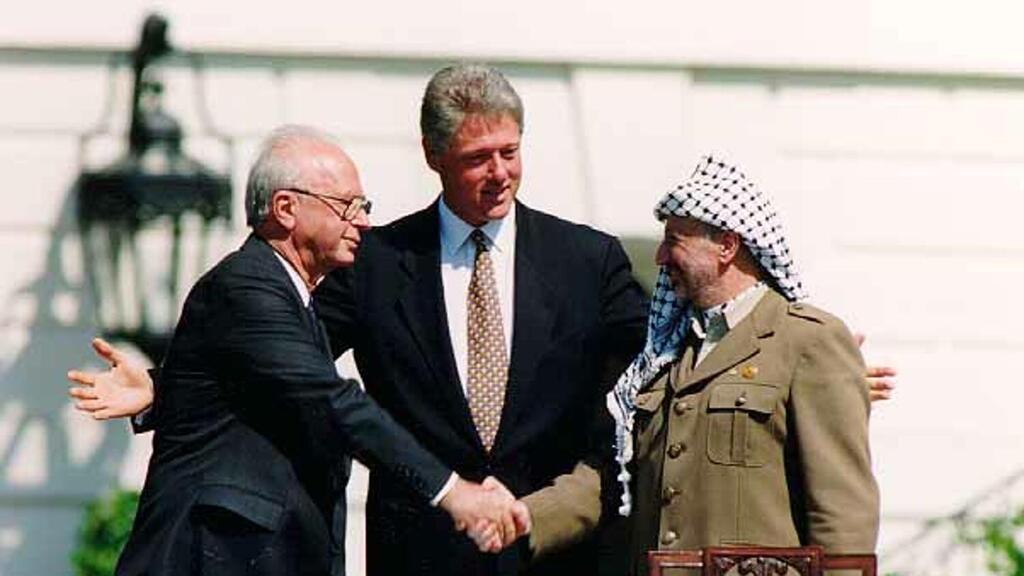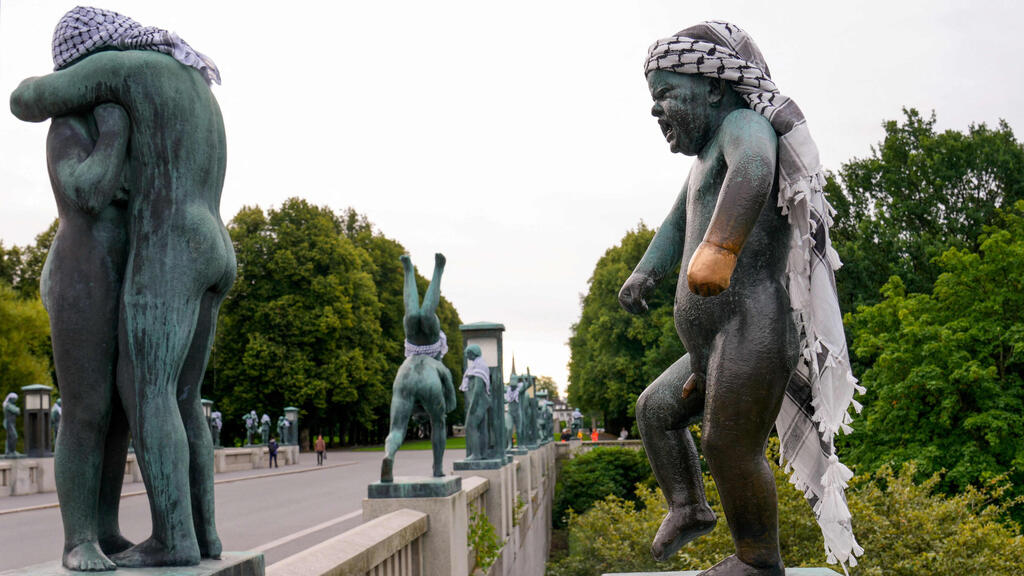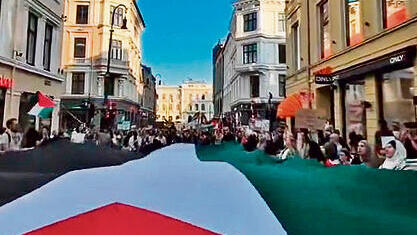Getting your Trinity Audio player ready...
It wasn’t always this way. The collapse of Israel-Norway relations - as illustrated in recent months with Norway’s recognition of a Palestinian state and Israel’s diplomatic blitz against Norway – is reminiscent of an ugly divorce, each partner taking out their years of pent-up anger and resentment on the other.
It began as a love story between two countries who found common ground, caring for one another and optimistically trying to bring peace to the Middle East. Three decades later, the experiment blew up in dissolution.
“I think Norway’s unilateral recognition of a Palestinian state is an admission of failure,” says Hilde Henriksen Waage (65) of Oslo University, a leading expert on Israel-Norway relations and the Oslo process in Norway.
“After the Cold War, in Norway, there was a desire to build up an image to make it stand out and remind the US that we’re here, that we’re more than a border with Russia and that
contrary to our geographical location, we’re in the middle of the action. It was decided we’d offer the world peace. And it’s failed. Not only is there no peace, but things have gotten much worse. And the finger’s being pointed entirely at Israel’s current government.”
Norway’s Deputy Foreign Minister Andreas Kravik views Norway’s unilateral recognition of a Palestinian state somewhat differently: “We did it to advance peace and recognition between Israel and Palestine. This is something we’re committed to," he says.
"We saw that the Oslo Accords took negative directions that have created a lack of security for both Israelis and Palestinians. So, we were forced to think differently about how to embolden the moderate elements, weakened in this brutal conflict. Both sides deserve peace, but there’ll be no peace without a two-state solution. And as the war in Gaza rages on, we have to preserve the two-state solution alternative.”
Norway took another step against Israel when it supported an arms embargo against Israel at the UN, while most European countries (including Sweden) abstained. Until the mid-'70s, the Norwegian public, along with the country’s political organizations, were clear Israel supporters.
5 View gallery


Signing of the Oslo Accords: Itzhak Rabin, Bill Clinton, Yasser Arafat
(Photo: Reuters)
Norway transferred two tons of heavy water to Israel for peace purposes, despite it's real use being clear to all. “We identified with Israel because, like Norway, it was a small country formerly ruled by others, and it had the image of a socialist paradise,” says Waage.
The first cracks began appearing following the 1967 Six-Day War with hints of whispers from Palestinian refugees on the streets. Then in July 1973, Mossad assassinated Ahmed Bouchikhi, a Moroccan waiter in Lillehammer, mistaking him for arch-terrorist Hassan Salameh who had participated in the Munich massacre.
“I remember as a child, sitting around the table with my parents’ friends” recalls Waage. “My parents were devout, Israel-loving, Christians. They were friends with a socialist couple from the radical left who openly supported Palestine before it was acceptable. When they started talking about Israel, they told me and my sister to go to the other room and then we heard yelling. My sister and I looked at each other and asked ‘Who are these crazy people and what’s making them lose their minds?’ When it came to choosing an MA thesis topic, this was my obvious choice.”
The real change came in 1978-82. Journalist Odd Karsten Tveit first traveled to the region after The Litani Operation and has since written over a dozen books on the subject. The most recent published last September was a bestseller. “When I got to the Middle East, there were already thousands of Norwegian soldiers serving as part of UNIFIL forces, he says. “These aren’t men from the radical left. These are conservatives who signed up for the role of 100% supporting Israel. When they finish, almost 100% of them are against Israel.”
Why?
“Because they’d been fed a fairytale and it turns out that Israel is the strong, occupying side. They witness IDF operations in Lebanon. Also, thousands of nurses, midwives and doctors volunteered in the West Bank, and they all come back to Norway telling their friends and family what they’ve seen, and the narrative begins to change.”
“Norway had a soft spot for Israel. When Mossad needed Norwegian passports for operations in the Soviet Union, they knew they could talk to someone here but, gradually, it started changing. The First Lebanon War and the invasion of Beirut and [the Christians' massacre] in the Sabra and Shatila refugee camps, changed the public discourse and opinion and began influencing the politicians. Now we see that Israel is reacting more harshly toward Norway than it is toward Spain and Ireland, who have also unilaterally recognized a Palestinian state.
What’s the difference?
“One difference is the emotional connection due to the Oslo Accords. We’re also not in the EU, so it’s easier to attack us.”
Tivet is referring to Foreign Minister Katz’s “retaliatory measures” against Norway: Israel rescinded the diplomatic status of eight Norwegian Embassy personnel working in cooperation with the Palestinian Authority, and Norway consequently closed its office in the West Bank.
“We had, and still have, deep friendly relations with Israel and Israeli citizens, but the extreme and unacceptable steps taken by the current government have proven to us that it is actively disrupting the two-state solution, the only solution for peace,” says Deputy Foreign Minister Kravik. “Norway isn’t hostile to Israel, it’s a friend. But friends need to be honest and talk about policies they don’t agree with.”
Leif Knutsen (63) is a member of Oslo’s Jewish community. Shortly following the October 7 massacre, he started publishing an almost daily newsletter offering an alternative to what the average Norwegian was getting from the country’s mainstream and social media.
“Since Oslo, the Norwegians have become obsessive about Israel. The collapse of the accords means that in politics, academia, the media, or on any platform influencing public opinion, everything about Israel is negative. This has led to the demonization of Israel among the Norwegian public, 50% of whom, when surveyed, responded that Israel is indeed doing to the Palestinians what the Nazis did to the Jews.”
Facing a community of 2,000 Jews, we have a quarter of a million Muslims in Oslo alone. This dictates the Norwegian narrative and politics. We also have a sharp increase in crime rate, and as this is statistically connected to certain minority communities here, we also see antagonism toward the Muslim minority and to the Pro-Palestinian demonstrations.”
Do you feel antisemitism here?
“We have antisemitism-based violence. People spit and curse and there are places - mainly in the big cities – where you wouldn’t identify as a Jew or as an Israeli. This comes primarily from the Muslims, who do the locals’ legwork for them. Although the locals have been brainwashed with antisemitism, claiming that Israel is conducting genocide and murdering children, they’re horrified when accused of antisemitism, as it’s not part of how they see themselves.
During this year’s International Women’s Day march, the organizers initially allowed Jewish women to march with signs protesting rape committed on October 7. When they showed up, however, other demonstrators blocked them shouting “No Zionists on our streets.” This act crossed the line for the public and the Norwegian prime minister also wrote a letter protesting the incident."
“Since October 7 and the ensuing war, we’ve witnessed an increase in antisemitism toward Jews in Europe, sadly including Norway,” says Deputy Foreign Minister Kravik. "The prime minister and foreign minister are in contact with the community and we’ve increased security. The Jews in Norway aren’t responsible for Israel’s policies and we’ll never accept antisemitism. Since October 7, we’ve fiercely condemned the Hamas attack and supported Israel’s right to defend itself within international law and have stressed the immediate need to unconditionally release all the hostages.”
Knutsen also explains internal factors contributing to the deteriorating discourse regarding, and hostility toward, Israel: “This government is operating badly and may be on its way to elections next year. Following October 7, a new foreign minister, Espen Barth Eide, came in from a humanitarian, rather than diplomatic background. Since assuming his position, he’s been under pressure from his party, demanding he take more drastic and aggressive measures against Israel.”
Eide blames Israel alone and has freely accepted Hamas’s versions of events and its casualty figures. His inexperience means he has said things to the media that would ordinarily get diplomats fired. (For example, the Israeli Embassy only learned of Norway’s recognition of Palestine through newspaper headlines).
Even before this, the government prevented the King of Norway from conveying his condolences to Israel following the massacre, claiming that this was the government's job, and sent off a particularly lukewarm message of condolence. Norway also refuses to recognize Hamas as a terrorist organization. The message is clear to the Norwegian public: the failing minority government is dependent on two left-wing parties and has dragged Norway to a clear anti-Israel stance, including, in August supporting the issue of arrest warrants for Benny Gantz and Prime Minister Benjamin Netanyahu.
“Here’s another example,” says Knutsen. “Just before the Passover holiday, the foreign minister ordered the state retailer responsible for the sale of alcohol, to remove all the wines from the West Bank and the Golan from the shelves. So, there wasn’t enough wine for the community. They wouldn’t dare do such a thing to any other minority. But what can we Jews do? Write a letter of complaint? “
“On the other hand, a survey conducted by The Norwegian Center for Holocaust and Minority Studies,” says John Arne Moen, chairman of Norway’s second largest Jewish community, in Trondheim, “shows that there’s a much better attitude toward Jews than toward Muslims.” The discrepancy between the government's hostility to Israel and the public’s attitude was also demonstrated by Norway’s public vote in the Eurovision semifinal, awarding Eden Golan a perfect score.
But across Oslo and other big cities, we’re seeing horrific exhibitions about the “genocide” Israel is conducting, including cuffed Gazans being led by Israeli soldiers to their execution, cheerful celebrations of the murder of Israelis at the Allenby Bridge and trampling on Israeli flags on the outskirts of the king’s palace.
However, as Israel flexes its muscles to rescind the status of diplomats operating in the West Bank, Norway closed its offices near Ramallah and accused the Israeli government of extremism. Part of this, an Israeli official told us, is about the Norwegian’s arrogant character. “They can do everything better than everyone else, even bringing about peace. They don’t have the capacity for soul-searching.”
Foreign Minister Barth Eide is a contributing factor to the crisis. He has compared Israel to Russia, claimed Israel is conducting war crimes, and has demanded other countries not sell arms to Israel so as not to be accused of war crimes. Norway, alongside Spain, Ireland and France, went back to financing UNRWA and spoke out against other countries who had frozen their UNRWA funding after it was revealed that 12 of its employees had taken part in the October 7 massacre. Eide claimed that “for 12 rotten apples, you don’t stop funding a whole organization.”
A senior Labor Party representative on Norway’s Committee of Foreign Affairs and Defense recommended UNRWA for the Nobel Peace Prize. Leading newspapers reported that “Israel started a war against Hamas.” The ruling Labor Party youth movement summer camps have been boycotting Israel for years. At the most recent summer camp, the teenagers were photographed in keffiyehs and holding signs accusing Israel of genocide.
“It’s very hard to persuade my students in lectures that Israel’s policies, even the very state, are right,” says Prof. Waage. “There’s a generation with no sympathy for Israel or knowledge of the Holocaust. I can give long lectures, and then they’ll ask me why I’m against boycotting Israel.”
Prof. Waage is Norwegian academia’s good and bad girl. She’s good at her job, and so has more access to material than other scholars. She’s bad as what she finds there, are things the government is trying to conceal. She learned Hebrew a decade ago so as not to depend on her (settler) research assistant as she rummages through the archive in Jerusalem. To her surprise, she found all of the Norwegian government’s secret Oslo documents there.
“The Oslo process actually began in 1979,” she says. “The Iranian regime fell and the US asked us to supply Israel with oil. Norway went to ask Arafat if that was okay by him, so as not to endanger Norwegian soldiers in Lebanon. He agreed, but asked Norway to mediate between him and the Israelis, as Israel viewed Norway as a friend.”
“We now understand how wrong we were. We were desperately trying to create this jewel for our image and were drunk on our own success. We’ve been telling ourselves this fairytale for 30 years, gracing the salons of, London Brussels and Washington. Until now, it’s been important for us to maintain friendly relations with Israel, but recognizing this failure has given us free rein to criticize Israel. Israel’s reaction, though, is simply insane. All this makes me concerned and really sad.”
Get the Ynetnews app on your smartphone:






